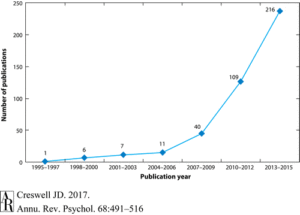The Academic Insight: Mindfulness Interventions a publication from The Annual Review of Psychology


In its yearly publication, the Annual Review of Psychology takes a look at the current empirical evidence for Mindfulness Interventions. In the article Dr. J. David Creswell reviews all relevant peer-reviewed research looking at the effectiveness of Mindfulness-based interventions and examines where Mindfulness interventions have been shown to be most effective. Dr. Croswell comments, “Some of the strongest and most reliable Randomized Controlled Trial evidence indicates that mindfulness interventions (and particularly 8-week mindfulness programs, such Mindfulness-Based Stress Relief and Mindfulness-Based Cognitive Therapy) improve the management of chronic pain, reduce depression relapse rates in at-risk individuals, and improve substance abuse outcomes.”
These encouraging findings are expanded upon in the article with additional emphasis put on the effectiveness of Mindfulness Interventions in substance abuse disorders. “Several well-controlled studies suggest that mindfulness interventions impact craving, drug use, and drug relapse rates in at-risk individuals. Mindfully attending to drug cues reduces neural and self-reported craving among smokers” The article goes on to highlight a 8-week Mindfulness-Based Relapse Prevention (MBRP) program developed by Dr. Alan Marlatt and colleagues “which integrates mindfulness meditation practices from Mindfulness-Based Stress Relief with Cognitive Behavior Therapy techniques for drug relapse prevention, including practices focused on mindfully attending to cravings (e.g., “urge surfing”)”
This review examines and confirms Mindfulness Interventions place as an evidence-based practice in treating substance use disorders as well as other mental health issues. This research is far from complete and the article looks ahead to where more research and clarification is needed. Despite the ongoing process of scientific research these results are nonetheless promising and provide practitioners, clinicians and loved ones another tool or option to help treat mental health and substance abuse issues. Citation and link to this journal article provided below.
Creswell, J. D. (2017). Mindfulness interventions. (Annual Review of Psychology).
Academic Insight is a new series being published on The O’Connor Professional Group’s blog highlighting the latest research and publications coming out of academia in the mental health and substance abuse fields.


